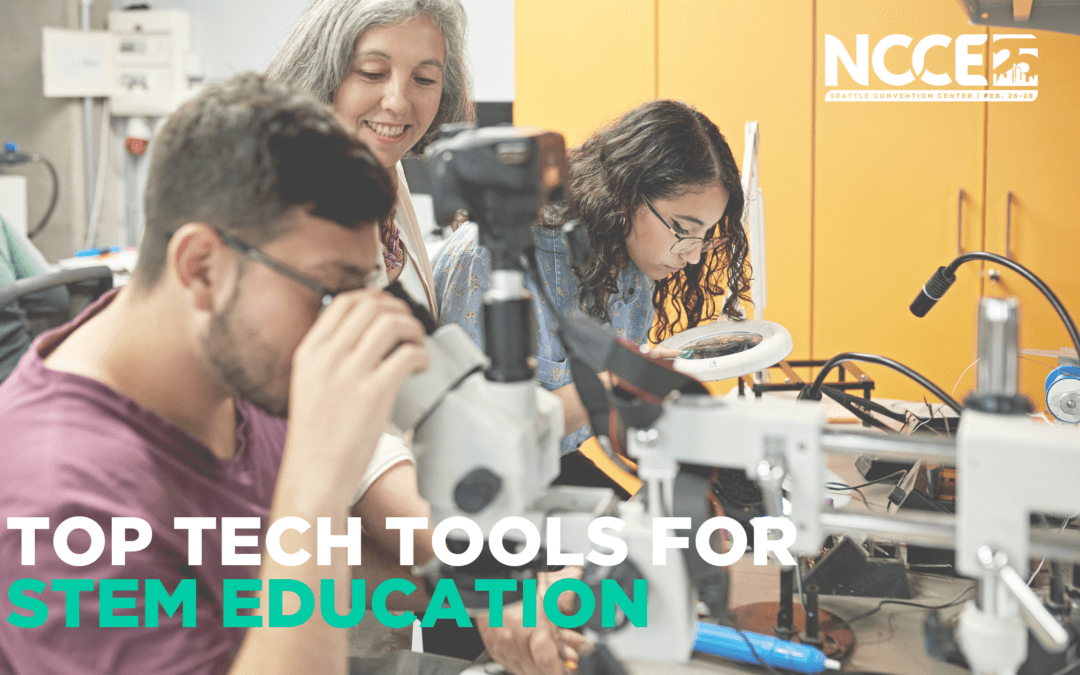STEM (Science, Technology, Engineering, and Mathematics) education is a natural fit for integrating technological education tools. After all, if you teach technical skills to students, it makes sense to use technical tools. These tech tools not only provide hands-on practical skills but also make complex concepts more accessible and engaging for learners.
Many tech tools are available to STEM educators that can enrich the classroom experience. We’ve encountered several of the top tech tools at the Northwest Council for Computer Education (NCCE), and here is a selection of those widely used in U.S. STEM education settings.
1. SAM Labs STEAM Kit
SAM Labs offers a comprehensive STEAM kit with sensors, blocks, and other components compatible with classroom materials like LEGO bricks. Each sensor has rechargeable batteries and Bluetooth connectivity, allowing students to explore basic electronics and integrate them into various projects. Using a hands-on approach fosters creativity and problem-solving skills.
2. Sphero Robots
Sphero robots are spherical devices that can be programmed to perform various tasks. They are ideal for teaching coding and robotics. They offer an interactive way for students to learn programming concepts and are suitable for various educational levels.
3. Micro:bit
Micro:bit is a pocket-sized computer designed to introduce students to coding and electronics. It features programmable LEDs, buttons, and sensors, allowing for a range of creative projects. Its simplicity and versatility make it a favorite in classrooms aiming to teach foundational STEM skills.
4. Tinkercad
Tinkercad is a user-friendly, web-based 3D design, electronics, and coding application. It enables students to create 3D models, simulate electronic circuits, and develop coding projects in a virtual environment. This tool is particularly useful for introducing students to computer-aided design (CAD) and prototyping.
5. Scratch
Developed by MIT Media Lab, Scratch offers a free programming language and an active online community where students can create interactive stories, games, and animations. Its block-based interface simplifies coding concepts, making it accessible for younger learners while still offering depth for more advanced projects.
6. Kahoot!
Kahoot! is a game-based education platform that allows instructors to create quizzes and interactive lessons. It introduces an element of fun to learning, engaging students and reinforcing STEM concepts through friendly competition.
7. Desmos
Desmos is a web application that provides students with an advanced graphing calculator. It’s a valuable tool for teaching mathematics, enabling students to visualize equations and functions dynamically. Desmos also offers activities and lessons tailored for classroom use.
8. PhET Interactive Simulations
This program was developed by the University of Colorado, Boulder. PhET provides free interactive math and science simulations that help students visualize and experiment with concepts in physics, chemistry, biology, and mathematics, enhancing understanding through interactive learning.
9. Code.org
Code.org is a nonprofit organization that offers free coding lessons and other coding resources for students of any age. Its curriculum includes interactive tutorials and projects that introduce students to computer science fundamentals, making it a valuable resource for educators aiming to incorporate coding into their STEM programs.
10. Google Workspace for Education
Google Workspace offers a suite of useful Google tools, including Google Docs, Sheets, Slides, and Classroom, that facilitate collaboration and organization in the classroom. These tools support project-based learning and allow students to work together seamlessly on STEM projects.
Integrating these tech tools into STEM education can significantly enhance student engagement and understanding, and they make learning both practical and enjoyable. By leveraging these resources, educators can create captivating interactive learning environments that prepare students for future challenges in STEM fields.
NCCE has long advocated integrating technology into education. With the increased interest in STEM, we encourage teachers and students to experiment with innovative teaching tools that can stimulate and motivate students to excel. For more information about our initiatives and services, contact NCCE today.

